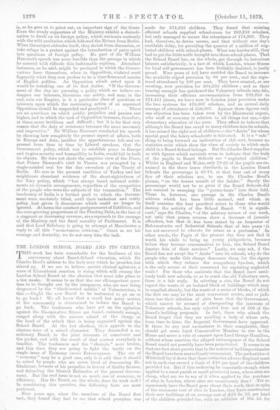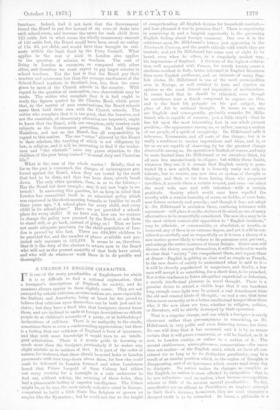THE LONDON SCHOOL BOARD AND ITS CRITICS.
School Board. At the last election, their appeals to the electors were of a mixed .character. They demanded a re- actionary Board, in the joint interests of conscience and the pocket, and with the result of that contest everybody is familiar. The tradesmen and the " clericals " were beaten, and this time they are going to fight the battle on the single issue of Economy versus Extravagance. The cry of " economy " may be a good one, only it is odd that it should be raised by people who are never tired of denouncing Mr. Gladstone, because of his prejudice in favour of thrifty finance, and defending the bloated Estimates of the present Govern- ment. But the real issue is not so much one of economy, as efficiency. Has the Board, on the whole, done its work well ? In considering this question, the following facts are most pertinent.
Nino years ago, when the members of the Board first met, they 'found they had to see that school provision was
made for 574,693 children. They found that existing efficient schools supplied school-room for 262,259 scholars, but only managed to secure the attendance of 174,801. They had, therefore, to devise means, and that without one day's avoidable delay, for providing the quarter of a million of neg- lected children with school-places. What was harder still, they had to get the little-waifs brought into those school-places. That the School Board has, on the whole, got through its herculean labours satisfactorily, is a fact of .which London, whose fitness for local self-government has been foolishly doubted, is justly proud. Nine years of toil have enabled the Board to increase the available school provision by 80 per cent., and the regis- tered attendance by 100 per cent. They have created, or are creating, new provision for .204,236 children ; and as their bracing example has quickened the Voluntary schools into life, increasing their efficient accommodation from 262,259 to 274,45.1 places, we have now in London joint provision under the two systems for 478,687 scholars, and an annual daily average of attendance of 350,507. Against these figures only one objection has been taken even by the Ministerial organs, who scoff at economy in relation to all things but one,--the elementary education of the poor. They affect to believe that although the Board has swept so many children into its schools, it has missed the right sort of children,—the "Arabs" for whose special good the heavy school-rate is tolerated. It is a " safe " thing to bring forward an insinuation of this sort, because no statistics exist which show the class of society to which each child in a Board School belongs. But Sir Charles Reed supplies us with figures which certainly seem to indicate that the bulk of the pupils in Board Schools are " neglected children." Whilst in England and Wales, only 79.23 of the pupils are.ex- amined in the three lower standards, in the London Board Schools the percentage is 83.14, so that four out of every five ol4 their . scholars are, to use Sir Charles Reed's phrase, " on the lowest rounds. of the ladder." Surely the percentage would not be so great if the Board Schools did not succeed in sweeping the "gutter-brats" into their fold. There is, however, one passage in Sir Charles Reed's address which has been little noticed, and whioh in itself contains the best practical retort to those who would destroy the activity of the School Board. " It is signifi- cant," says Sir Charles, " of the salutary nature of our work, not only that prison returns show a decrease of juvenile offenders, but that it has been stated by an Inspector of Reformatories and Industrial Schools that of late years ' it has not answered to educate for crime as a profeasion.' In other words, the Fagin of the present day does not find it worth his while to bring up young pickpockets, because before they become remunerative to him, the School Board deprive him of their services." Lastly, we may ask, if the Board has not swept the " Arabs " into its schools, why do the people who make this charge denounce them for the rigour with which they enforce the compulsory bye-law, which is the only means at -their command for capturing neglected waifs ? For those who maintain that the Board have need- lessly built new schools, so as to crush the old Voluntary ones, there is a fair reply. In selecting a site, the Board do not regard the wants of an isolated block of buildings which may be supplied already, but the wants of a series of blocks, of which the first one may be the niost convenient centre, and so judi- cious has their selection of sites been that the Government, which cannot be accused of disregarding the interests of Voluntary schools, has only rejected four out of 800 of the Board's building proposals. In fact, those who attack the Board forget that they are assailing a body of whose acts, from time to time, the Imperial Government have approved. If those be any real earnestness in their complaints, they should get some loyal Conservative Member to rise in the House and move a vote of censure upon Lord George Hamilton, without whose sanction the alleged extravagance of the School Board could not possibly have been perpetrated. It seems to us that one fact alone proves that in the matter of building estimates the Board have been marvellously economical. The authorities at Whitehall lay it down that these estimates allover England must not in each case exceed a.limit of £10 per head of the children provided for. But if this reckoning be reasonable enough when applied to a rural parish or small provincial town, where sites are cheap, what are we to say of it when applied to the purchase of sites in London, where sites are monstrously dear ? Yet so ingeniously have the Board gone about their work, that in spite of the enormous cost of sites in London, they have constructed their new buildings at an average cost of £10 2s. 3d. per head of the children provided for, with an addition of 10s. 5d. for
furniture. Indeed, had it not been that the Government forced the Boar& to put five instead of six rows of desks into each school-room, and increase the space for each child from 125 cubic feet to what smiths the wholly unnecessary amount of 150 cubic feet, the Board would have been saved an outlay of 17s. Gd. per child, and would have thus brought its esti- mate within the limit fixed by the Privy Council. What applies to the cost of sites in London also applies
to the question of salaries to teachers. The cost of living in London in excessive, as compared with other cities, and therefore we must expect to pay larger salaries to school teachers. Yet the fact is that the Board pay their masters and mistresses less than the average emolument of the School-Board teachers in Scotland, less, too, than the sums given by most of the Church schools in the country. With- regard to the question of instruction, two observations may be made. The critics who complain that it is bad ought to study the figures quoted by Sir Charles Reed, which prove that, in the matter of pass examinations, the Board schools more than hold their own with the Church schools. The critics who complain that it is too good, that the luxuries, and not the essentials, of elementary education are imparted, ought to know that the Board, with one exception, only teaches such subjects as the Government 'Prescribes. On Lord George Hamilton, and not on the Board, lies all responsibility in regard to this matter. The one "extra "allowed by the Board to their scholars, the teaching of which is not obligatory by law, is religion, and it will be interesting to find if the trades- men and " the clericals " raise any grave objection to the children of the poor being trained " to social duty and Christian
What is the, sum of the whole matter ? Briefly, that so far as the past is concerned, the charges of extravagance pre- ferred against the Board, when they are tested by the work that had to be done, and that has been done, utterly break down. The only other question, then, is as to the future,— Has the Board not done enough ; may it not now begin to re- trench ? In answering this question, let us keep in mind that London has committed itself to an education policy which was expressed in the electioneering formula so familiar to us all three years ago, " A school-place for every child, and every child in its school-place." Have we yet provided' a school- place for every child ? If we have not, how can we venture to change the policy now pursued by the Board, or ask them to stand still, or go back, instead of going on That we have not made adequate provision for the child-population of Lon- don is proved by this fact. There are 098,908 children to be provided for, and the number of places available and pro- jected only amounts to 513,299. It seems to us, therefore, that it is the duty of the electors to return men to the Board who will act as the present majority of that body have acted, and who will do whatever work there is to do quickly and thoroughly.

































 Previous page
Previous page